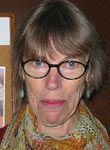De Bary discusses language, culture in world literature
By Erik Johnson

How do language and culture interact in world literature, and how significant is their relationship in defining the way we think as a society? These questions were the focus of "Traveling, and Translating, the Distance: Tawada Yoko and the Thought of World Literature," the Society for the Humanities Annual Invitational Lecture, Feb. 24 in Goldwin Smith Hall.
In the lecture, Brett de Bary, professor of Asian studies and comparative literature, discussed interactions between language and culture by referring to the texts and translations of Japanese author Tawada Yoko, whose works deal largely with the arbitrary nature of cultural boundaries in differentiating language and words. Such questions provide rich material for Tawada, who writes in both Japanese and German. De Bary presented Tawada as one of a growing number of gifted writers whose works reflect a global aesthetic sensibility.
She cited the fluid nature of Tawada's prose, which often fuses different cultural symbols into a single language and which questions the strength of boundaries that hold the ideas of linguistics and culture together.
In assessing the language that characterizes literary works dealing with translation as travel, de Bary noted the importance of space in literary narrative, and how in literature around the world, "naturalistic mapping is both pervasive but also open to question in translation studies." She invited the audience to "imagine world literature not in terms of territories mapped onto the globe, but instead as a fluid sphere," in the way Tawada imagines in her writings, blending symbols from different cultures into a single line of language.
De Bary noted that Tawada's writings, through their fusion of disconnected linguistic imagery, demonstrate a space in which language and culture are at odds, and in which there is an original and "violent process of boundary production" that allows the author to wrestle with the serious questions of contemporary life in a globalized world. In the modern world, de Bary said, there are "overlapping national boundaries" that have given rise, especially in modern Japanese prose, to the idea of "flatness" between the past and present on a global scale.
Because of the "non-equivalence of words" that occurs in translation, de Bary noted, "the constant task of the translator is that of shifting between two symbolic systems." In this sense, de Bary described the work of Tawada as something that "works in that conflicted space" between language and culture, and which ultimately questions the solidity of their relationship. It is part of the "convoluted nature of translation," she said.
De Bary's research interests include modern Japanese fiction and film, comparative literary theory and translation theory. She is also an associate editor of "Traces: A Multilingual Series of Translation and Cultural Theory" and has served as director of the Visual Studies Program and of the Society for the Humanities.
Erik Johnson is a writer intern for the Cornell Chronicle.
Media Contact
Get Cornell news delivered right to your inbox.
Subscribe